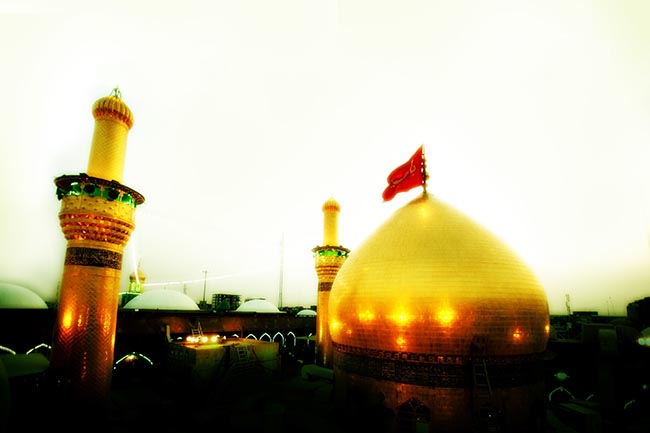On the day of Ashura many Muslims partake in large peaceful gatherings where they recite poems in memory of Imam Husain (A.S) and his sacrifice whilst lamenting and beating their chest as a cultural tradition to display their grievance. Many people use the day of Ashura as a day to perform acts of kindness and charity as a way for them keep alive the very same principles and values Husain (A.S) gave his life for.
However, the distortion of the event of Ashura (10th of Muharram) and misrepresentation of Husain’s (A.S) objectives and messages have affected the culture of mourning and changed the intellectual discourse into emotional myth among the mourners. This distortion is not a recent issue but started a day after the revolution as oppressors sought to empty it from values. A number of Imam’s proponents were unintentionally engaged in similar activities. Unaware of being pawn to the ill-intentioned, some show tendency in mythologizing the event of Ashura, altering its values, and misconstruing its objectives.
With easy access to the means of communication, and the interaction of contemporary men with different faith and beliefs, nothing will be veiled in secrecy and people will understand the fact. Therefore, the need for pathological study and abolishing distortion is felt more than ever before. Since mourning ceremonies are the most significant centers for spreading the message of Imam’s revolution, any misrepresentations in this field will be seriously damaging to the objectives of this historical revolution. So, exploring the current damaging issues will be of great importance.
Considering the current sensitivity across the country, the clergy and preachers are responsible to put an end to any kinds of distortion in conducting Ashura and mourning ceremonies and should not weaken the epic of this event. Emotional attitude towards this revolution, irrespective of other aspects, and chanting soulful poems will only beef up the sentimental dimension of Ashura’s incident that will necessarily keep the audience away from the pure mindset of Husain (A.S). Stating the issues which are in conflict with the characteristics of Husain’s (A.S) household or religious tenets, imposing personal tastes, having a baseless say will add to the distortion of this sacred movement. Ill-fatedly, a number of preachers have not enlightened this revolution truly or deeply for the public.
There is no doubt that Imam Husain (A.S) along with his companions suffered great tragedy and the Kufa militants resorted to most horrible and catastrophic acts in this revolution. To view this revolution from this lens, it will be a great tragic issue. Our folklore points out the tragic aspect of Ashura to the extent that the epic aspect is overshadowed. Indeed, this notion exists in the minds and thoughts of some religious scholars and preachers, too. For instance, there are statements about individuals that their presence on Ashura is veiled in doubt. The history about this issue is distorted. It is believed that the silence or confirmation of some religious scholars is one of the main reasons behind this falsification. The society’s intellectuals, scholars and religious elements will have to realize the facts and figure out the roots of society’s rise and fall and show an appropriate reaction in this regard. If the said people neglect this fact, distortion and exaggeration will continue faster than ever before.
The clergy need to think better than the masses, resist boldly against distortion, and play their constructive role in the best possible way. Purifying and reforming public culture is the responsibility of the elite. The role of religious scholars is similar to surgeons and they have to do surgical operation so as to remove the unnecessary elements. The clergy have to raise their voice and act upon religious tenets despite being reacted negatively. Perhaps one will fear weakening the public faith by showing reaction to such distortion. But showing no reaction will do more harm than good, that is, if falsification is revealed for the public, it will weaken their faith.
The next reason behind this distortion is copying the folklore of a nation or of an ethnic group in terms of conducting mourning ceremony. For instance, the way of flagellating ourselves by chained-knife in conducting mourning ceremony on Ashura is a product imported from other cultures.
In brief, mourning ceremonies should be conducted in the way conforming with the true spirit of this sacred revolution and to our native culture. The event of Karbala has to reinforce unity, coexistence, peaceful life, and the spirit of brotherhood in Islamic societies rather than being falsified or weakened with superstition.
The first Prime Minister of India Pandit Jawaharlal Nehru is quoted as saying, “The best lesson which we get from the tragedy of Karbala is that Husain and his followers were the rigid believers of God. They illustrated that numerical superiority does not count when it comes to truth and falsehood. The victory of Husain despite his minority marvels me.”
Home » Opinion » The Need for Ending Distortion from Ashura’s Episode
The Need for Ending Distortion from Ashura’s Episode
| Jawad Sorosh

